2016年北京大学翻译硕士考研真题
- 格式:pdf
- 大小:342.12 KB
- 文档页数:14
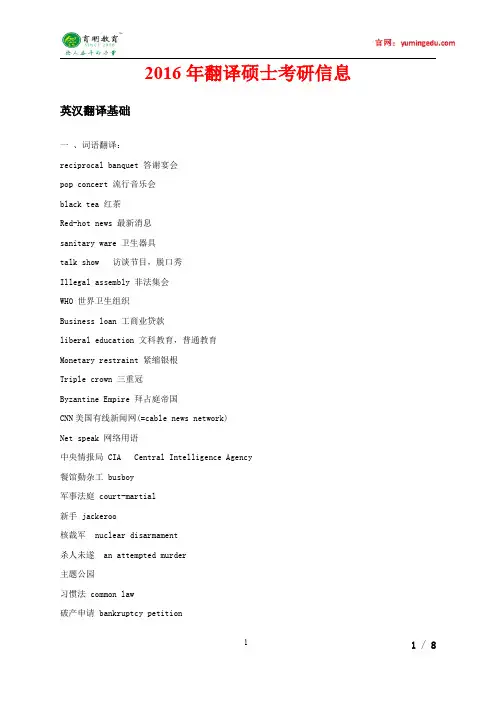
2016年翻译硕士考研信息英汉翻译基础一、词语翻译:reciprocal banquet答谢宴会pop concert流行音乐会black tea红茶Red-hot news最新消息sanitary ware卫生器具talk show访谈节目,脱口秀Illegal assembly非法集会WHO世界卫生组织Business loan工商业贷款liberal education文科教育,普通教育Monetary restraint紧缩银根Triple crown三重冠Byzantine Empire拜占庭帝国CNN美国有线新闻网(=cable news network)Net speak网络用语中央情报局CIA Central Intelligence Agency餐馆勤杂工busboy军事法庭court-martial新手jackeroo核裁军nuclear disarmament杀人未遂an attempted murder主题公园习惯法common law破产申请bankruptcy petition经济指标economic indicator学费减免Tuition-Waiver半决赛semifinals百老汇大街broadway病毒清除程序virus scanner.桂冠诗人poet laureate二、语篇翻译:1、汉译英:(育明教育注:这次不是古文,是现代文,是钱钟书的文章节选)西洋的大诗人很多,第一个介绍到中国来的偏偏是郎费罗。
郎费罗的好诗或较好的诗也不少,第一首译为中文的偏偏是《人生颂》。
那可算是文学交流史对文学教授和评论家们的小小嘲讽或挑衅!历史上很多——现在也就不少——这种不很合理的事例,更确切地说,很不合学者们的理想和理论的事例。
这些都显示休谟所指出的,“是这样”(is)和“应该怎样”(ought)两者老合不拢。
在历史过程里,事物的发生和发展往往跟我们闹别扭,恶作剧,推翻了我们定下的铁案,涂抹了我们画出的蓝图,给我们的不透风、不漏水的严密理论系统搠上大大小小的窟窿。
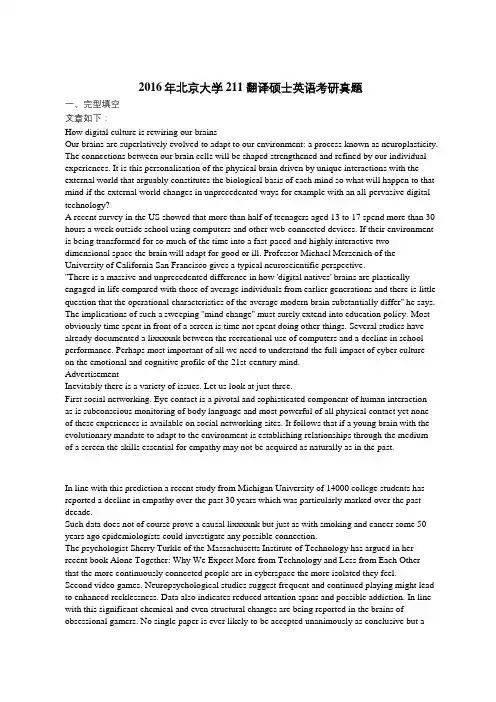
2016年北京大学211翻译硕士英语考研真题一、完型填空文章如下:How digital culture is rewiring our brainsOur brains are superlatively evolved to adapt to our environment: a process known as neuroplasticity. The connections between our brain cells will be shaped strengthened and refined by our individual experiences. It is this personalisation of the physical brain driven by unique interactions with the external world that arguably constitutes the biological basis of each mind so what will happen to that mind if the external world changes in unprecedented ways for example with an all-pervasive digital technology?A recent survey in the US showed that more than half of teenagers aged 13 to 17 spend more than 30 hours a week outside school using computers and other web-connected devices. If their environment is being transformed for so much of the time into a fast-paced and highly interactive two-dimensional space the brain will adapt for good or ill. Professor Michael Merzenich of the University of California San Francisco gives a typical neuroscientific perspective.''There is a massive and unprecedented difference in how 'digital natives' brains are plastically engaged in life compared with those of average individuals from earlier generations and there is little question that the operational characteristics of the average modern brain substantially differ'' he says. The implications of such a sweeping ''mind change'' must surely extend into education policy. Most obviously time spent in front of a screen is time not spent doing other things. Several studies have already documented a lixxxxnk between the recreational use of computers and a decline in school performance. Perhaps most important of all we need to understand the full impact of cyber culture on the emotional and cognitive profile of the 21st-century mind.AdvertisementInevitably there is a variety of issues. Let us look at just three.First social networking. Eye contact is a pivotal and sophisticated component of human interaction as is subconscious monitoring of body language and most powerful of all physical contact yet none of these experiences is available on social networking sites. It follows that if a young brain with the evolutionary mandate to adapt to the environment is establishing relationships through the medium of a screen the skills essential for empathy may not be acquired as naturally as in the past.In line with this prediction a recent study from Michigan University of 14000 college students has reported a decline in empathy over the past 30 years which was particularly marked over the past decade.Such data does not of course prove a causal lixxxxnk but just as with smoking and cancer some 50 years ago epidemiologists could investigate any possible connection.The psychologist Sherry Turkle of the Massachusetts Institute of Technology has argued in her recent book Alone Together: Why We Expect More from Technology and Less from Each Other that the more continuously connected people are in cyberspace the more isolated they feel.Second video games. Neuropsychological studies suggest frequent and continued playing might lead to enhanced recklessness. Data also indicates reduced attention spans and possible addiction. In line with this significant chemical and even structural changes are being reported in the brains of obsessional gamers. No single paper is ever likely to be accepted unanimously as conclusive but asurvey of 136 reports using 381 independent tests and conducted on more than 130000 participants concluded that video games led to significant increases in desensitisation physiological arousal aggression and a decrease in prosocial behaviour.Third search engines. Can the internet improve cognitive skills and learning as has been argued? The problem is that efficient information processing is not synonymous with knowledge or understanding. Even the chairman of Google Eric Schmidt has said: ''I worry that the level of interrupt the sort of overwhelming rapidity of information - and especially of stressful information - is in fact affecting cognition. It is in fact affecting deeper thinking. I still believe that sitting down and reading a book is the best way to really learn something.'' Given the plasticity of the brain it is not surprising adapting to a cyber-environment will also lead to positives - for example enhanced performance in skills that are continuously rehearsed such as a mental agility similar to that needed in IQ tests or in visuomotor co-ordination. However we urgently need a fuller picture.二、阅读理解(四篇)第三篇原文如下:The rise in female employment also seems to have coincided with (or perhaps precipitated) a similarly steep rise in standards for what it means to be a good parent and especially a good mother. Niggling feelings of guilt and ambivalence over working outside the home together with some social pressures compel many women to try to fulfil idealised notions of motherhood as well says Judy Wajcman a sociology professor at the London School of Economics and author of a new book "Pressed for Time: The Acceleration of Life in Digital Capitalism".The struggle to "have it all" may be a fairly privileged modern challenge. But it bears noting that even in professional dual-income households mothers still handle the lion's share of parenting—particularly the daily routine jobs that never feelfinished. Attentive fathers handle more of the enjoyable tasks such as taking children to games and playing sports while mothers are stuck with most of the feeding cleaning and nagging. Though women do less work around the house than they used to the jobs they do tend to be the never-ending ones like tidying cooking and laundry. Well-educated men chip in far more than their fathers ever did and more than their less-educated peers but still put in only half as much time as women do. And men tend to do the discrete tasks that are more easily crossed off lists such as mowing lawns or fixing things round the house. All of this helps explain why time for mothers and especially working mothers always feels scarce. "Working mothers with young children are the most time-scarce segment of society" says Geoffrey Godbey a time-use expert at Penn State University. Parents also now have far more insight into how children learn and develop so they have more tools (and fears) as they groom their children for adulthood. This reinforces another reason why well-off people are investing so much time in parenthood: preparing children to succeed is the best way to transfer privilege from one generation to the next. Now that people are living longer parents are less likely to pass on a big financial bundle when they die. So the best way to ensure the prosperity of one's children is to provide the education and skills needed to get ahead particularly as this human capital grows ever more important for success.This helps explain why privileged parents spend so much time worrying over schools and chauffeuring their children to résumé-enhancing activities. "Parents are now afraid of doing less than their neighbors" observes Philip Cohen a sociology professor at the University of Maryland who studies contemporary families. "It can feel like an arms race."No time to loseLeisure time is now the stuff of myth. Some are cursed with too much. Others find it too costly to enjoy. Many spend their spare moments staring at a screen of some kind even though doing other things (visiting friends volunteering at a church) tends to make people happier. Not a few presumethey will cash in on all their stored leisure time when they finally retire whenever that may be. In the meantime being busy has its rewards. Otherwise why would people go to such trouble?Alas time ultimately is a strange and slippery resource easily traded visible only when it passes and often most highly valued when it is gone. No one has ever complained of having too much of it. Instead most people worry over how it flies and wonder where it goes. Cruelly it runs away faster as people get older as each accumulating year grows less significant proportionally but also less vivid. Experiences become less novel and more habitual. The years soon bleed together and end up rushing past with the most vibrant memories tucked somewhere near the beginning. And of course the more one tries to hold on to something the swifter it seems to go.Writing in the first century Seneca was startled by how little people seemed to value their lives as they were living them—how busy terribly busy everyone seemed to be mortal in their fears immortal in their desires and wasteful of their time. He noticed how even wealthy people hustled their lives along ruing their fortune anticipating a time in the future when they would rest. "People are frugal in guarding their personal property; but as soon as it comes to squandering time they are most wasteful of the one thing in which it is right to be stingy" he observed in "On the Shortness of Life" perhaps the very first time-management self-help book. Time on Earth may be uncertain and fleeting but nearly everyone has enough of it to take some deep breaths think deep thoughts and smell some roses deeply. "Life is long if you know how to use it" he counseled.Nearly 2000 years later de Grazia offered similar advice. Modern life that leisure-squandering money-hoarding grindstone-nosing frippery-buying business left him exasperated. He saw that everyone everywhere was running running running but to where? For what? People were trading their time for all sorts of things but was the exchange worth it? He closed his 1962 tome "Of Time Work and Leisure" with a precision.三、排序文章如下:Modern CriticismDICKSON D. BRUCE JR.W. E. B. Du Bois and the Idea of Double ConsciousnessAs scholars have developed a greater understanding of the importance of African American literature to the American tradition they have also developed a real appreciation for the critical place of the thought of W. E. B. Du Bois in both that literature and that tradition in the twentieth century. In particular they have focused on the famous passage from Du Bois's 1897 Atlantic magazine essay "Strivings of the Negro People" -- later republished with revisions in The Souls of Black Folk (1903) -- in which Du Bois spoke of an African American "double consciousness" a "two-ness" of being" an American a Negro; two warring ideals in one dark body whose dogged strength alone keeps it from being torn asunder."Du Bois's use of the idea of double consciousness to characterize issues of race was provocative and unanticipated; however as has only occasionally been noted and never really pursued the term itself had a long history by the time Du Bois published his essay in 1897. Du Bois wrote about double consciousness in a way that drew heavily on that history to create a fairly coherent pattern of connotations in both the essay and the later book. The background of meaning which the term evoked would have been familiar to many if not most of the educated middle- and upper-class readers of the Atlantic one of the foremost popular journals of letters of the day and should have contributed much to the understanding of Du Bois's arguments by those readers.In using the term "double consciousness" Du Bois drew on two main sources. One of these was essentially figurative a product of European Romanticism and American Transcendentalism. The other not entirely unrelated and mentioned briefly by historian Arnold Rarnpersad in his ownanalysis of Du Bois's work was initially medical carried forward into Du Bois's time by the emerging field of psychology. Here the term "double consciousness" was applied to cases of split personality; by the late nineteenth century it had come into quite general use not only in professional publications but also in discussions of psychological research published for general audiences as well .The figurative sources for Du Bois's idea of double consciousness are in some ways the most telling. Although one can identify from nineteenth-century literature several possible precedents for Du Bois's use of the term-from Whittier for example or George Eliot-Werner Sollors has described this figurative background as Ernersonian and indeed one of the earliest such occurrences of the term may be found in Emerson's works; In an 1843 essay entitled "The Transcendentalist" a piece he had delivered earlier as a lecture Emerson employed the term "double consciousness" to refer to a problem in the life of one seeking to take a Transcendental perspective on self and world. Constantly he wrote the individual is pulled back from the divine by the demands of daily life. The Transcendentalist knows" moments of illumination" and this makes his situation all the more difficult because lie then sees his life from the perspective those moments create as too much dominated by meanness and insignificance. As Emerson wrote "The worst feature of this double consciousness is that the two lives of the understanding and of the soul which lie leads really show very littlerelation to each other: one prevails now all buzz and din; the other prevails then all infinitude and paradise; and with the progress of life the two discover no greater disposition to reconcile themselves." Concerned with different issues Emerson used the term in a way that was not exactly the same as Du Bois's. But there was more than enough similarity to make Emerson's a useful background to what Du Bois was trying to say.In Emerson's essay "double-consciousness" evoked a set of oppositions that had become commonplace in Transcendentalism and as other scholars have shown in Romanticism generally. In the passage itself was a dichotomy between "the understanding" and "the soul" but even that referred to a more general set all organized around a central division between world and spirit. The double consciousness plaguing the Transcendentalist summarized the downward pull of life in society -- including the social forces inhibiting genuine self-realization and the upward pull of communion with the divine; the apparent chaos of things as they are and the unity of Nature comprehended by universal law; and the demanding cold rationality of commercial society and the search for Truth Beauty and Goodness -- especially Beauty-that ennobled the soul. Human beings in the world could not escape its downward pull. The worldly was an essential part of living one's life. The Transcendental double consciousness grew out of an awareness that Nature and the soul were so much more.A similar set of oppositions was an important part of Du Bois's argument in his "Strivings of the Negro People." Although in the essay Du Bois used "double consciousness" to refer to at least three different issues -- including first the real powerof white stereotypes in black life and thought and second the double consciousness created by the practical racism that excluded every black American from the mainstream of the society the double consciousness of being both an American and not an American -- by double consciousness Du Bois referred most importantly to an internal conflict in the African American individual between what was "African" and what was "American." It was in terms of this third sense that the figurative background to "double consciousness" gave the term its most obvious support because for Du Bois the essence of a distinctive African consciousness was its spirituality a spirituality baxxxxsed in Africa but revealed among African Americans in their folklore their history of patient suffering and their faith. In this sense double consciousness related particularly to Du Bois's efforts to privilege the spiritual in relation to the materialistic commercial world white America. "Negro blood has a message for the world" he wrote and this message as he had been saying since at least 1888 was of aspiritual sense and a softening influence that black people could bring to a cold and calculating world. What Sherman Paul says of Emerson's stress on the "feminine eye" one may also say of Du Bois's stress on the African soul that it serves as an alternative to a dominant inability to "see" apart from the possibilities for action and profit a notion Du Bois played on when guided by his important figure of the "veil" lie described the African American as gifted with a kind of "second sight."四、作文computer translation 的发展前景,以后需不需要人力的参与,以此为话题写作文,要求尤其讨论人力的参与与否。
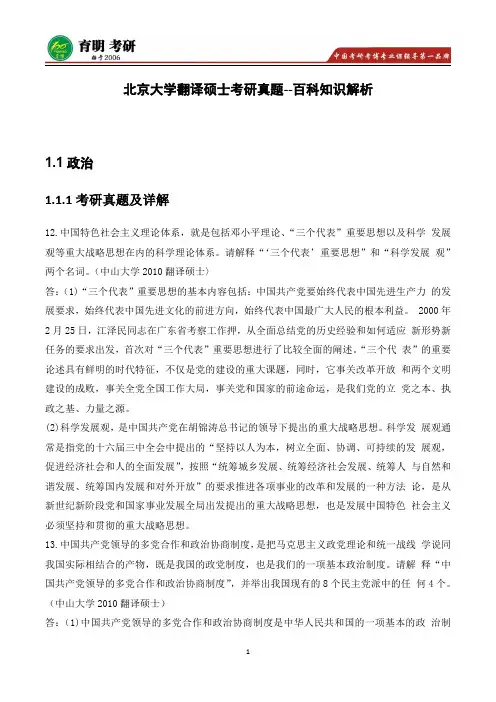
北京大学翻译硕士考研真题--百科知识解析1.1政治1.1.1考研真题及详解12.中国特色社会主义理论体系,就是包括邓小平理论、“三个代表”重要思想以及科学发展观等重大战略思想在内的科学理论体系。
请解释“‘三个代表’重要思想”和“科学发展观”两个名词。
(中山大学2010翻译硕士〉答:(1)“三个代表”重要思想的基本内容包括:中国共产党要始终代表中国先进生产力的发展要求,始终代表中国先进文化的前进方向,始终代表中国最广大人民的根本利益。
2000年2月25日,江泽民同志在广东省考察工作押,从全面总结党的历史经验和如何适应新形势新任务的要求出发,首次对“三个代表”重要思想进行了比较全面的阐述。
“三个代表”的重要论述具有鲜明的时代特征,不仅是党的建设的重大课题,同时,它事关改革开放和两个文明建设的成败,事关全党全国工作大局,事关党和国家的前途命运,是我们党的立党之本、执政之基、力量之源。
(2)科学发展观,是中国共产党在胡锦涛总书记的领导下提出的重大战略思想。
科学发展观通常是指党的十六届三中全会中提出的“坚持以人为本,树立全面、协调、可持续的发展观,促进经济社会和人的全面发展”,按照“统筹城乡发展、统筹经济社会发展、统筹人与自然和谐发展、统筹国内发展和对外开放”的要求推进各项事业的改革和发展的一种方法论,是从新世纪新阶段党和国家事业发展全局出发提出的重大战略思想,也是发展中国特色社会主义必须坚持和贯彻的重大战略思想。
13.中国共产党领导的多党合作和政治协商制度,是把马克思主义政党理论和统一战线学说同我国实际相结合的产物,既是我国的政党制度,也是我们的一项基本政治制度。
请解释“中国共产党领导的多党合作和政治协商制度”,并举出我国现有的8个民主党派中的任何4个。
(中山大学2010翻译硕士)答:(1)中国共产党领导的多党合作和政治协商制度是中华人民共和国的一项基本的政治制度,是具有中国特色的政党制度。
这一制度的基本内容包括以下几个方面。
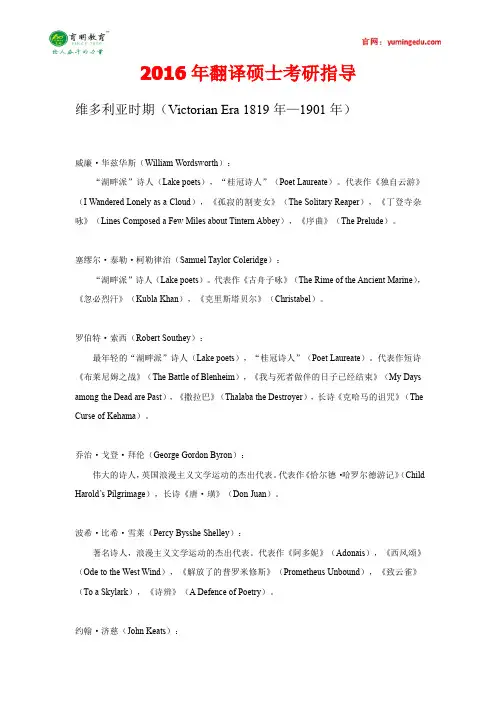
2016年翻译硕士考研指导维多利亚时期(Victorian Era1819年—1901年)威廉·华兹华斯(William Wordsworth):“湖畔派”诗人(Lake poets),“桂冠诗人”(Poet Laureate)。
代表作《独自云游》(I Wandered Lonely as a Cloud),《孤寂的割麦女》(The Solitary Reaper),《丁登寺杂咏》(Lines Composed a Few Miles about Tintern Abbey),《序曲》(The Prelude)。
塞缪尔·泰勒·柯勒律治(Samuel Taylor Coleridge):“湖畔派”诗人(Lake poets)。
代表作《古舟子咏》(The Rime of the Ancient Marine),《忽必烈汗》(Kubla Khan),《克里斯塔贝尔》(Christabel)。
罗伯特·索西(Robert Southey):最年轻的“湖畔派”诗人(Lake poets),“桂冠诗人”(Poet Laureate)。
代表作短诗《布莱尼姆之战》(The Battle of Blenheim),《我与死者做伴的日子已经结束》(My Days among the Dead are Past),《撒拉巴》(Thalaba the Destroyer),长诗《克哈马的诅咒》(The Curse of Kehama)。
乔治·戈登·拜伦(George Gordon Byron):伟大的诗人,英国浪漫主义文学运动的杰出代表。
代表作《恰尔德·哈罗尔德游记》(Child Harold’s Pilgrimage),长诗《唐·璜》(Don Juan)。
波希·比希·雪莱(Percy Bysshe Shelley):著名诗人,浪漫主义文学运动的杰出代表。
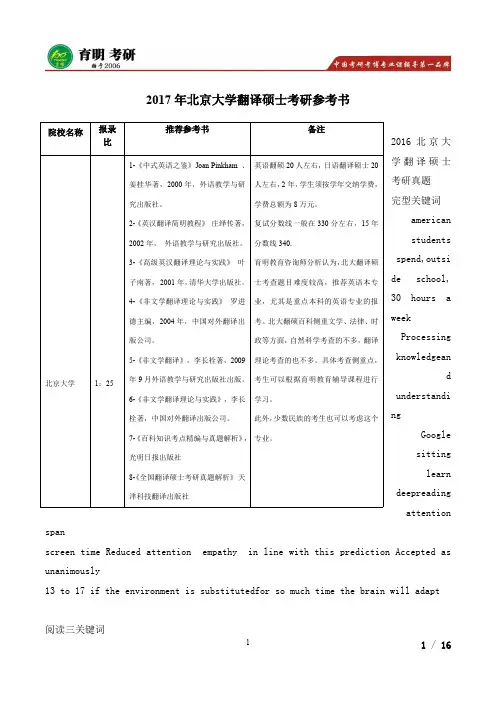
2017年北京大学翻译硕士考研参考书2016北京大学翻译硕士考研真题完型关键词americanstudentsspend,outsideschool,30hours a weekProcessingknowledgeandunderstandingGooglesittinglearndeepreadingattention spanscreen time Reduced attentionempathy in line with this prediction Accepted as unanimously13to 17if the environment is substitutedfor so much time the brain will adapt 阅读三关键词院校名称报录比推荐参考书备注北京大学1:251-《中式英语之鉴》Joan Pinkham 、姜桂华著,2000年,外语教学与研究出版社。
2-《英汉翻译简明教程》庄绎传著,2002年,外语教学与研究出版社。
3-《高级英汉翻译理论与实践》叶子南著,2001年,清华大学出版社。
4-《非文学翻译理论与实践》罗进德主编,2004年,中国对外翻译出版公司。
5-《非文学翻译》,李长栓著,2009年9月外语教学与研究出版社出版。
6-《非文学翻译理论与实践》,李长栓著,中国对外翻译出版公司。
7-《百科知识考点精编与真题解析》,光明日报出版社8-《全国翻译硕士考研真题解析》天津科技翻译出版社英语翻硕20人左右,日语翻译硕士20人左右,2年,学生须按学年交纳学费,学费总额为8万元。
复试分数线一般在330分左右,15年分数线340.育明教育咨询师分析认为,北大翻译硕士考查题目难度较高,推荐英语本专业,尤其是重点本科的英语专业的报考。
北大翻硕百科侧重文学、法律、时政等方面,自然科学考查的不多,翻译理论考查的也不多。
具体考查侧重点,考生可以根据育明教育辅导课程进行学习。
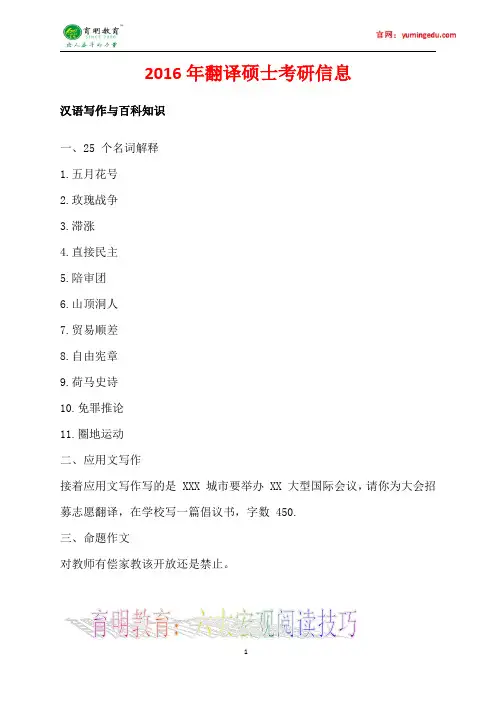
2016年翻译硕士考研信息汉语写作与百科知识一、25个名词解释1.五月花号2.玫瑰战争3.滞涨4.直接民主5.陪审团6.山顶洞人7.贸易顺差8.自由宪章9.荷马史诗10.免罪推论11.圈地运动二、应用文写作接着应用文写作写的是XXX城市要举办XX大型国际会议,请你为大会招募志愿翻译,在学校写一篇倡议书,字数450.三、命题作文对教师有偿家教该开放还是禁止。
(1)一般而言,每篇阅读理解只讲一个主题,阅读时应通过段落主题句把握中心。
(2)考研文章的两类体裁:议论文,重点是作者的观点和态度。
说明文,重点是作者的态度,说明对象及其特点。
(3)阅读时看清文章是由几个自然段构成的,同时还要给文章分段,便于更好的回文章定位。
(4)阅读的重点位置时文章的首段、其余各段的段首段尾句、转折处、条件关系处、因果关系处,快速读过的信息是举例子的内容、引用的内容、类比的内容、具体数字以及冒号后面补充说明的部分。
(5)每个选项都应力争回文中定位,全部题目都能做到正确答案在原文中对应的位置,判断出出题的方式以及错误答案的特征。
(6)文章固定模式:A花开两朵,各表一枝模式:在文章开始提出两个核心概念,随后分段叙述。
关键:两个概念的定义以及他们的区别和联系。
B问题答案型模式:在第一段中出现一个问题,在随后各段提出该问题的答案。
关键:把握其中心往往就是该问题最直接最主要的答案。
C时文特点:耸人听闻,吸引眼球;貌似客观,内涵态度;抛砖引玉,一起争论阅读时文时,把握时文的中心出现在手段的末句,或者二段的首句。
D独句段出现一个句子单独成段,特别是其出现在文章开始或者结尾,一般其表达的是文章的中心思想。
若位于文章中间部分一般是承上启下的作用。
E开门见山文章的写作特点是:直接给出观点,摆出事实论据,进行推理论证,每段都紧扣文章的主题。
F启承传合阅读时要抓住论点,区分论点合论据的关系,因为题目设计往往围绕论点进行,并要注意把握文章首尾的前后呼应关系。
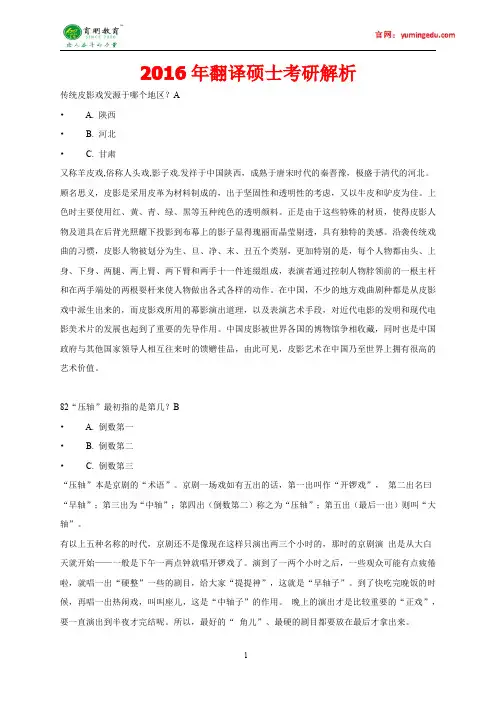
2016年翻译硕士考研解析传统皮影戏发源于哪个地区?A• A.陕西• B.河北• C.甘肃又称羊皮戏,俗称人头戏,影子戏.发祥于中国陕西,成熟于唐宋时代的秦晋豫,极盛于清代的河北。
顾名思义,皮影是采用皮革为材料制成的,出于坚固性和透明性的考虑,又以牛皮和驴皮为佳。
上色时主要使用红、黄、青、绿、黑等五种纯色的透明颜料。
正是由于这些特殊的材质,使得皮影人物及道具在后背光照耀下投影到布幕上的影子显得瑰丽而晶莹剔透,具有独特的美感。
沿袭传统戏曲的习惯,皮影人物被划分为生、旦、净、末、丑五个类别,更加特别的是,每个人物都由头、上身、下身、两腿、两上臂、两下臂和两手十一件连缀组成,表演者通过控制人物脖领前的一根主杆和在两手端处的两根耍杆来使人物做出各式各样的动作。
在中国,不少的地方戏曲剧种都是从皮影戏中派生出来的,而皮影戏所用的幕影演出道理,以及表演艺术手段,对近代电影的发明和现代电影美术片的发展也起到了重要的先导作用。
中国皮影被世界各国的博物馆争相收藏,同时也是中国政府与其他国家领导人相互往来时的馈赠佳品,由此可见,皮影艺术在中国乃至世界上拥有很高的艺术价值。
82“压轴”最初指的是第几?B• A.倒数第一• B.倒数第二• C.倒数第三“压轴”本是京剧的“术语”。
京剧一场戏如有五出的话,第一出叫作“开锣戏”,第二出名曰“早轴”;第三出为“中轴”;第四出(倒数第二)称之为“压轴”;第五出(最后一出)则叫“大轴”。
有以上五种名称的时代,京剧还不是像现在这样只演出两三个小时的,那时的京剧演出是从大白天就开始——一般是下午一两点钟就唱开锣戏了。
演到了一两个小时之后,一些观众可能有点疲倦啦,就唱一出“硬整”一些的剧目,给大家“提提神”,这就是“早轴子”。
到了快吃完晚饭的时候,再唱一出热闹戏,叫叫座儿,这是“中轴子”的作用。
晚上的演出才是比较重要的“正戏”,要一直演出到半夜才完结呢。
所以,最好的“角儿”、最硬的剧目都要放在最后才拿出来。
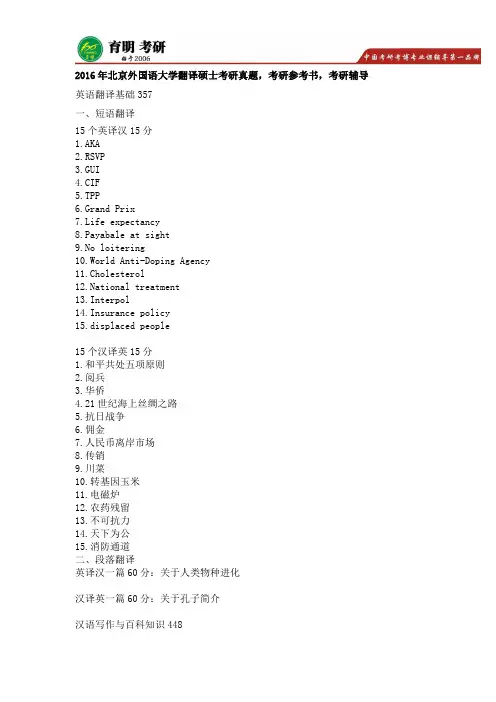
2016年北京外国语大学翻译硕士考研真题,考研参考书,考研辅导英语翻译基础357一、短语翻译15个英译汉15分1.AKA2.RSVP3.GUI4.CIF5.TPP6.Grand Prix7.Life expectancy8.Payabale at sight9.No loitering10.World Anti-Doping Agency11.Cholesterol12.National treatment13.Interpol14.Insurance policy15.displaced people15个汉译英15分1.和平共处五项原则2.阅兵3.华侨4.21世纪海上丝绸之路5.抗日战争6.佣金7.人民币离岸市场8.传销9.川菜10.转基因玉米11.电磁炉12.农药残留13.不可抗力14.天下为公15.消防通道二、段落翻译英译汉一篇60分:关于人类物种进化汉译英一篇60分:关于孔子简介汉语写作与百科知识448一、名词解释25分1.TPP2.哈姆莱特3.巴尔扎克4.新航路5.但丁6.斯巴达克7.普罗米修斯8.国风9.西欧近代三大思想解放运动10.阿克琉斯11.离骚12.霍去病13.张衡14.张仲景15.傅雷16.三大宗教翻译家17.小李杜18.大江健三郎19.西厢记20.牡丹亭21.一条鞭法22.昆阳之战23.癫张狂素24.川端康成25.南欧三大半岛二、应用文写作45分:写一篇倡议书三、大作文60分:以“累,并快乐着”为题写一篇散文(了解更多考研真题、考研经验、内部模拟押题等考研初试复试信息可咨询育明教育夏老师)2017年政治基础班讲义考点21:辩证思维方法的主要方法辩证思维方法的主要方法包括:归纳与演绎、分析与综合、抽象与具体、逻辑与历史相统一(一)归纳与演绎归纳和演绎是最初的也是最基本的思维方法。
1.相互区别归纳是从个别到一般的方法,即从个别事实中概括出一般原理。
演绎是从一般到个别的方法,即从一般原理推论出个别结论。
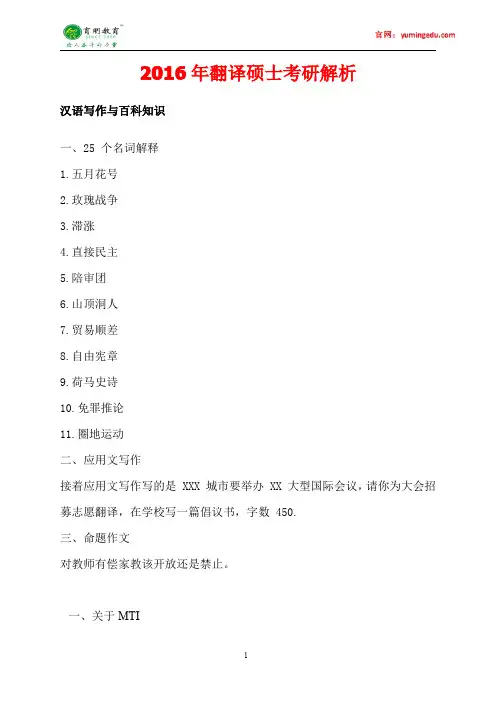
2016年翻译硕士考研解析汉语写作与百科知识一、25个名词解释1.五月花号2.玫瑰战争3.滞涨4.直接民主5.陪审团6.山顶洞人7.贸易顺差8.自由宪章9.荷马史诗10.免罪推论11.圈地运动二、应用文写作接着应用文写作写的是XXX城市要举办XX大型国际会议,请你为大会招募志愿翻译,在学校写一篇倡议书,字数450.三、命题作文对教师有偿家教该开放还是禁止。
一、关于MTI学硕和专硕的区别可以百度,目前的形式是国家要把学硕和专硕的比例变为3:7(今年已经是这样)。
翻译专业MTI确实很热,虽然开设院校越来越多,但水平却是参差不齐,第一批第二批水平有目共睹,确实有实力……而且难度可以对比近四年真题,越来越难。
我们这种学英语的是没有专业的,语言充其量就是个工具。
非英语专业英语整得好的一抓一大把,所以最终要靠英语活的话还是要好好打算下。
二、选学校的问题问得最多的就是怎么选学校,这个真是要具体问题具体分析。
一般三种,按院校,按专业,按地区。
我当初选首先排除南方院校,因为离家远;然后根据专业,列出了北方院校所有属于前两批MTI的院校。
这样就缩小了很多,然后在北京和天津之间选,所有真题做一遍选定了最合适自己的北语。
成绩出来后山哥问我是不是报的太低,这也是好多人一直想问的,我幽幽的和山哥说:这说明这学校适合我啊,换一个也许就挂了。
有的院校MTI偏重文学,有的偏重科技,还有医药,海事,商务,环保,交通,政经……各种,各种翻译我做政经比较有感脚,当然哲理性散文也可以了啦。
北语就是这个套路,所以就他了。
鞋舒不舒服只有脚知道,所以自己做的顺手才是王道。
另,有一些部委,比如中央外联,组织部招聘语言类,特别是英语,只要语言类院校毕业的学生,这也是我的一个考虑。
我老师的观点是:“语言类院校考试题目比较灵活,注重整体水平的考察,复试注重口语。
其他综合以及工科院校对词汇语法等硬性要求较高”。
复试在北语,感觉语言类院校很有学习语言的赶脚。
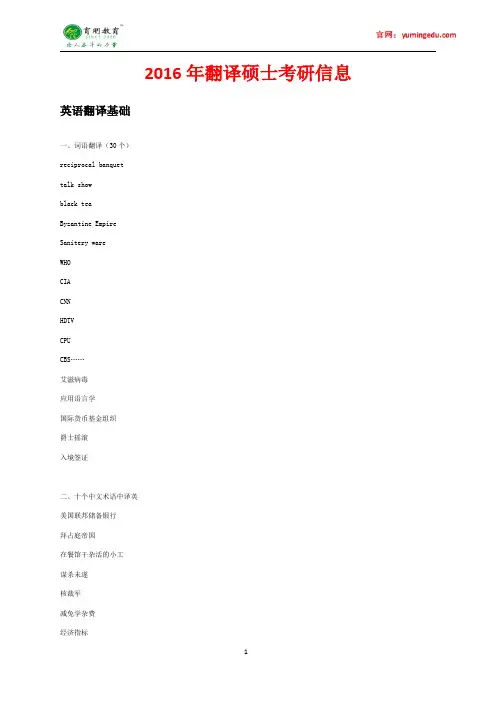
2016年翻译硕士考研信息英语翻译基础一、词语翻译(30个)reciprocal banquettalk showblack teaByzantine EmpireSanitery wareWHOCIACNNHDTVCPUCBS……艾滋病毒应用语言学国际货币基金组织爵士摇滚入境签证二、十个中文术语中译英美国联邦储备银行拜占庭帝国在餐馆干杂活的小工谋杀未遂核裁军减免学杂费经济指标三、汉译英【育明教育注:文言文翻译】俗传书生入官库,见钱不识。
或怪而问之,生曰:“固知其为钱,但怪其不在纸裹中耳。
”予偶读渊明《归去来辞》云幼稚盈室瓶无储粟乃知俗传信而有征使瓶有储粟亦甚微矣此翁平生只于瓶中见粟也耶?《马后纪》:夫人见大练以为异物;晋惠帝问饥民何不食肉糜,细思之,皆一理也,聊为好事者一笑。
永叔常言:“孟郊诗:‘鬓边虽有丝,不堪织寒衣’,纵使堪织,能得多少?”(选自苏轼《论贫士》)【育明教育注解】相传有一个书生进入官府的钱库,看见了钱竟不认识了。
有人认为奇怪便问他,书生说:“我本来知道那是钱,但奇怪于它不在纸的包裹中罢了。
”我偶然读陶渊明的《归去来辞》,上面说:“儿童满屋子,瓶里面没有储存的粮食。
”才知道传说中贫士入官库一一确实可信。
即使瓶中有储存的粮食,也是很少的了。
难道这老头平生只在瓶中见过粮食吗?《马后纪》上说:诸嫔妃见到马后穿的粗帛衣服,反以为是特别的东西。
晋惠帝问饥民为什么不吃肉粥。
细细思考,都是同一种道理啊。
说这些只是让喜欢多事的人一笑罢了。
欧阳修常说:“孟郊诗‘鬓边虽有丝,不堪织寒衣’。
即使能织,又能织多少呢?”四、英译汉不是很长,三段,夏洛蒂·勃朗特写她们三姐妹是如何产生将自己的创作整理出版的过程及对他们笔名选取的缘由的文章,有若干生词,及一两个比较难翻难组织语言的长句,整体难度不大,但文学性较强,估计对翻译的文笔优美度有较高要求。
【育明教育注释】夏洛蒂:(Charlotte Brontë)夏洛蒂像她成功塑造的人物形象简·爱一样,个子矮小,其貌不扬,充满智慧和独立的精神。
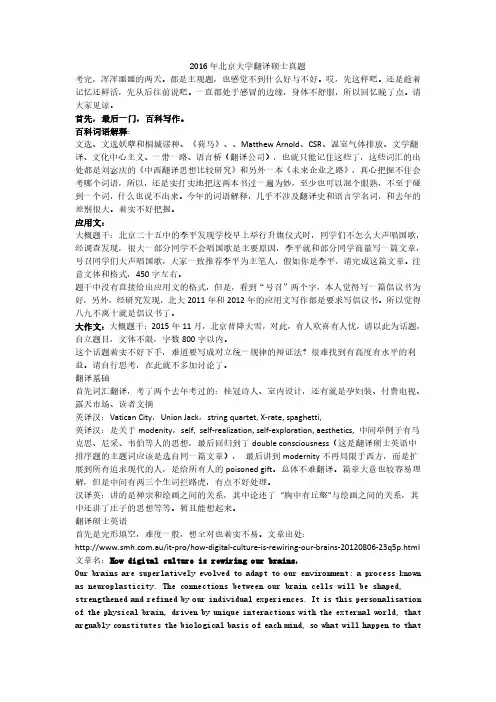
2016年北京大学翻译硕士真题考完,浑浑噩噩的两天。
都是主观题,也感觉不到什么好与不好。
哎,先这样吧。
还是趁着记忆还鲜活,先从后往前说吧。
一直都处于感冒的边缘,身体不舒服,所以回忆晚了点。
请大家见谅。
首先,最后一门,百科写作。
百科词语解释:文选、文选妖孽和桐城谬种、《荷马》、、Matthew Arnold、CSR、温室气体排放、文学翻译、文化中心主义、一带一路、语言桥(翻译公司),也就只能记住这些了,这些词汇的出处都是刘宓庆的《中西翻译思想比较研究》和另外一本《未来企业之路》,真心把握不住会考哪个词语,所以,还是实打实地把这两本书过一遍为妙,至少也可以混个眼熟,不至于碰到一个词,什么也说不出来。
今年的词语解释,几乎不涉及翻译史和语言学名词,和去年的差别很大。
着实不好把握。
应用文:大概题干:北京二十五中的李平发现学校早上举行升旗仪式时,同学们不怎么大声唱国歌,经调查发现,很大一部分同学不会唱国歌是主要原因,李平就和部分同学商量写一篇文章,号召同学们大声唱国歌,大家一致推荐李平为主笔人,假如你是李平,请完成这篇文章。
注意文体和格式,450字左右。
题干中没有直接给出应用文的格式,但是,看到“号召”两个字,本人觉得写一篇倡议书为好,另外,经研究发现,北大2011年和2012年的应用文写作都是要求写倡议书。
所以觉得八九不离十就是倡议书了。
大作文:大概题干:2015年11月,北京普降大雪,对此,有人欢喜有人忧,请以此为话题,自立题目,文体不限,字数800字以内。
这个话题着实不好下手,难道要写成对立统一规律的辩证法?很难找到有高度有水平的利益。
请自行思考,在此就不多加讨论了。
翻译基础首先词汇翻译,考了两个去年考过的:桂冠诗人、室内设计,还有就是孕妇装、付费电视、露天市场、读者文摘英译汉:Vatican City,Union Jack,string quartet,X-rate,spaghetti,英译汉:是关于modenity,self,self-realization,self-exploration,aesthetics,中间举例子有马克思、尼采、韦伯等人的思想,最后回归到了double consciousness(这是翻译硕士英语中排序题的主题词应该是选自同一篇文章),最后讲到modernity不再局限于西方,而是扩展到所有追求现代的人,是给所有人的poisoned gift。
北京大学翻译硕士考研真题--百科知识解析1.1政治1.1.1考研真题及详解1.“我们首先应当确定一切人类生存的第一个前提也就是一切历史的第一个前提,这个前提就是:人们为了能够‘创造历史’,必须能够生活。
但是为了生活,首先就需要衣、食、住以及其他东西。
因此第一个历史活动就是生产满足这些需要的资料,即生产物质生活本身。
”下列最能准确概括这段话含义的是()。
(北航2010翻译硕士)A.物质文明为精神文明提供物质条件B.生产物质生活本身是人类生存的第一个前提C.人类的物质生产决定其精神生产D.生产物质生活本身是人类的第一个历史活动【解析】这段话主要讲的是物质文明的问题。
引号里面的话可概括为:生产物质生活本身是人类生存的第一个前提,也是第一个历史活动,并由此得出结论:物质文明为精神文明提供一定的物质条件”。
BD两项都是对引号中内容的总结,过于片面;C项原文中没有提到。
2.“以民为本”的思想是我国古代政治、哲学的精髓,这对我们树立和落实以人为本的科学发展观颇有启迪。
下列名言中没有蕴含这一思想的是()。
(北航2010翻译硕士)A•安得广厘千万间,大庇天下寒士俱欢颜B•采得百花成蜜后,为谁辛苦为谁甜C.居庙堂之高则忧其民,处江湖之远则忧其君D先天下之忧而忧,后天下乏乐而乐【解析】B项,“采得百花成蜜后,为谁辛苦为谁甜”巧妙地切中了蜜蜂辛劳一生,却不知为谁作嫁的主题,道出了世态炎凉,人情冷暖,因而成为历久不衰、流传至今的佳句。
诗人借蜂喻人,比喻农民的劳动成果被剥夺。
现被世人用于感叹自己的苦心白费、血汗白流。
也有用以赞扬辛勤为民、毫无私心的高尚情操,并无“以民为本”之意。
A项,怎么才能得到千万间宽敞高大的房子,普遍地庇护天下间贫寒的读书人,让他们个个都开颜欢笑(杜甫《茅屋为秋风所破歌》);C项,那些忧国忧民之士,当他在朝廷做官时,心里想的是黎民百姓,而当他流落于民间时,则想着如何为君主效力;D项,在天下人忧之前先忧,在天下人乐之后才乐。
2016年翻译硕士考研指导北京大学汉语基础壹汉语语言学基础知识(80分)一、填空题(每小题一分,共30分)1.“凸”字的笔顺是:_______。
2.“弓”字的笔顺是:_______。
3.从造字法看,“灭”是________。
4.从部件和部件的组合方式来看,“爽”字是:___________。
5.“恭”字的形容是:__________6.汉字的形声字中,形旁字和声旁字的配置方式是多样的,如“国”就属于____________。
7.汉字演变为现代汉字的转折点是:___________。
8.语言系统是发展的,凭借着_____________,亲属语言和文字这三个方面,我们可以了解到语言系统中语音是怎么变化的。
9.普通话中,“舌根不送气清塞音”用汉语拼音和国际音标分别标写为“g”和___________,而“舌根浊鼻音”用汉语拼音标写则为___________________。
10.普通话中,我们把“i”描述为__________。
11.普通话的音节最多由___________部分组成。
12.具有区别意义作用的音高和音强都是______________音位。
13.福建话属于__________方言。
14.声母发音的三个阶段是成阻,__________________,除阻。
15.普通话中有一个辅音补充当声母,只做韵尾,它就是____________。
16.从词的构造看,“花朵”属于________,而“歪歪扭扭”属于___________。
17.虚词“即使”,“纵使”兼表两个语法意义,一个是假设,另一个是_________,假如:“即使找不到事情做,我们也不求他。
”18.熟语包括成语,谚语,__________和________等。
19“老”在“年龄大”的意义上同_____________构成反义关系。
20.由一个语素造成的词叫做_________。
21.“男,女”在词类划分上属于_________。
22.从语法结构上看,“是政府把人从吸毒的火炕里救了出来”,属于_________,结构。
2016年翻译硕士考研真题北京外国语大学考研真题,育明教育学员回忆英语翻译基础35715个英译汉15分1.AKA2.RSVP3.GUI4.CIF5.TPP6.Grand Prix7.Life expectancy8.Payabale at sight9.No loitering10.World Anti-Doping Agency11.Cholesterol12.National treatment13.Interpol14.Insurance policy15.displaced people15个汉译英15分1.和平共处五项原则2.阅兵3.华侨4.21世纪海上丝绸之路5.抗日战争6.佣金7.人民币离岸市场8.传销9.川菜10.转基因玉米11.电磁炉12.农药残留13.不可抗力14.天下为公15.消防通道英译汉一篇60分:关于人类物种进化汉译英一篇60分:关于孔子简介汉语写作与百科知识448名词解释25分1.TPP2.哈姆莱特3.巴尔扎克4.新航路5.但丁6.斯巴达克7.普罗米修斯8.国风9.西欧近代三大思想解放运动10.阿克琉斯11.离骚12.霍去病13.张衡14.张仲景15.傅雷16.三大宗教翻译家17.小李杜18.大江健三郎19.西厢记20.牡丹亭21.一条鞭法22.昆阳之战23.癫张狂素24.川端康成25.南欧三大半岛应用文写作45分:写一篇倡议书大作文60分:以“累,并快乐着”为题写一篇散文1.坚定的决心请随时随地问自己:我到底想要什么?是想要,还是一定要?如果是想要,我们可能什么都得不到;如果是一定要,我们一定能够有方法得到。
考研成功就在于你做决定的那一刻。
知道自己需要什么,是发展坚韧的最重要的一步。
强烈的驱策力会使一个人去克服许多的困难。
所以,复习一开始就要确定自己要考哪所大学,分析考上的难度,给自己定个位,告诉自己要实现这个目标需要付出多少汗水。
2.强烈的愿望一个顶尖的推销员最优秀的素质是要有强烈的成交愿望,一个优秀足球前锋最可贵的素质是强烈的射门意识。
16年翻译硕士考研详解与指导北京大学大家除了要看那些历史名词、人物、事件、经济名词、文学名词之外,还要看看翻译术语,语言学。
大学中文系的语言学课程包括<古代汶语>、<现代汶语>、<语言学概论>等。
刘宓庆:《中西翻译思想比较研究》,中国对外翻译出版公司,2005年。
思果:《翻译研究》,中国对外翻译出版公司,2001年。
余秋雨:《问学•余秋雨:与北大学生谈中国文化》,陕西师范大学出版社,2009年。
期刊:《中国翻译》,范围包括2013年全年各期。
2010年北京大学翻译硕士试题回顾英语基础(1月9号下午考)前三十个单选题,主要考词汇和语法,语法都是长句子,词汇比较难,有些GRE里面出现过的。
考词汇差不多就是近义词选择,容易模棱两可拿不定注意,所以背单词弄清其具体用法非常重要。
之后是篇很长的阅读,内容涉及各个时期的科学和宗教的问题,从达尔文的进化论讲起,恩格斯,弗洛伊德,爱因斯坦等许多人都观点都有所提及。
篇后的问题首先是五个选择,理解文中某些自居的意思。
然后有几道paraphrase,解释文中划线句子。
然后一道问题,针对文中某句弗洛伊德的话问:“what will Freud probably do according to the text."(原题怎么问的忘了,大概意思是这个)。
然后是问答题,比较文中提到的science god和technology god的异同。
最后是作文:silence and power.400字英语翻译(1月10号上午)1.十个英文术语英翻中,内容比较简单,但是涉及面广,很容易一时半会想不起来。
有诸如“艾滋病毒,应用语言学,国际货币基金组织,爵士摇滚,入境签证,美国联邦储备银行。
2.十个中文术语中翻英。
能记住有:“HDTV,CPU,CBS”3.英翻中,论贫穷的一篇文章。
文中涉及观点:“贫穷带来两个好处,一是使人慷慨,二是消除人们对生活虚妄的幻想。
2016年翻译硕士考研指导翻译硕士英语一、30个选择题前面的要不就是选项太相似,难区分;要不就是语法现象抠的太细,总之觉得是对基础和功底的考察,所谓“基础不牢,地动山摇”啊。
比如:20世纪30年代,是the1930s,1930s,the1930's,1930s',还有给你4个句子,让你选正确的,或者选个错误的。
还有给你一个句子,问你其中有几个错误,2个,3个,4个还是5个。
总之是词难的不认识,词简单的选项迷惑你,可能第一感觉很重要吧。
二、阅读两篇第一篇写爱尔兰经济危机的,分析了危机根源,将之与冰岛经济做了对比,语气充满讽刺。
5个选择题,单选(。
),文章其实很简单,能99%看得懂,就是题出的有点绕,不太确定答案。
第二篇是写清教徒进驻美洲大陆,对美国社会产生的影响,包括他们带来的三权分立,政教分离雏形,在社会中形成的自由友好的氛围,8个问答题,全部围绕这些内容提问,包括:作者是否同意霍桑对清教徒的描述,清教徒为什么要来美洲,他们对美国社会的贡献有哪些,他们为什么对法治那么看重并维护,政教分离为什么那么重要。
等三、作文how internet has transformed our traditional concept of friendship400词1、357英语翻译基础到了冲刺复习阶段,最好的就是考研历年的翻译真题和前期整理的笔记。
真题可以解决考研翻译中的单词问题、句子结构问题、翻译考点问题;笔记可以将参考书由厚变薄,加快复习进度。
下面强调一下翻译真题的使用方法:(1)模拟考试,写出译文之所以要“写出译文”,是因为我们是在“做”翻译,不是“看”翻译。
很多学习英语的人都有这样的经验:明明自己把句子看懂了,也大概理解英语原文,可是就是表达不出来,经常是“只可意会,不可言传”。
问题就在于翻译实践的练习不够,“做”得不够。
(2)精雕细琢,自我提高首先,要完全理解原文,对原文中不懂的单词,需要翻翻词典,如果这个单词是大纲单词,你没有掌握的话,你需要把这个单词记录下来,以备后面自己作为基础来掌握。
2016年翻译硕士考研指导2010年真题(原题)翻译硕士英语一、将下列段落译为汉语(25分)Outside Europe,the most important powers in1939were undoubtedly Japan and the United States. Japan was at the time already deeply involved in hostilities with China.After seizing the northern provinces of that country in1931and organizing them into the puppet state of Manchukuo,Japan had tried to protect its rich loot and to expand its influence in China by a series of interventions, particularly in the rest of northern China.These steps had not surprisingly produced a rising tide of anti-Japanese sentiments in China,which in turn led the Japanese to embroil themselves even more deeply into Chinese affairs.When this tendency to interfere in China was combined with a degree of internal confusion and incoherence within the Japanese government that made the Chinese warlords of the time look well organized,new trouble was almost certain to follow.(141 words)二、将下列短文译为汉语(50分)Inflation:China’s least wanted export.When inflation starts to kill people then it is a serious problem.Three people died and31were injured on Saturday in a stampede to buy cut-price cooking oil in the western Chinese city of Chongqing.China can no longer explain away inflation as a short-term result of floods and epidemics of animal disease?nor can it ignore the strains its macroeconomic policies are producing.Cooking oil is a special case?its price influenced by demand from China’s glut of new biofuel refineries?but the broader price of food has risen in recent months by more than15per cent compared with a year earlier.Floods and other acts of God have had their effect,as has the global rise in wheat prices,but there are structural forces at work as well.Nor is inflation confined to food any longer:producer prices are creeping up.The PPI for manufactured goods was up3.2per cent in October?many steel products rose by more than10percent?and the PPI is likely to go even higher when the recent10per cent hike in the controlled pump price of diesel feeds through.Given the likelihood that more state-controlled prices will have to rise,and given that the official inflation data do not properly capture important prices, such as the cost of education,the real situation may be even worse.That is a worry for the rest of the world,used to enjoying the“China price”,a seemingly open-ended deflationary pressure on the world economy.The surge in Chinese inflation since June has barely fed through into export prices yet?but it will.China’s currency has also been gently appreciating,but so far improvements in productivity have meant that Chinese manufacturers have not needed to raise export prices.If currency appreciation speeds up,that will change.The renminbi may have to rise faster because the tools that China is using to tackle inflation have not worked.Bank reserve requirements were hiked again over the weekend,to13.5per cent, but the strain on the banking sector’s profitability will start to tell.Interest rates have risen repeatedly,but with CPI inflation above6per cent,and benchmark lending rates only slightly higher,real interest rates are low.There must now be a low,but non-zero,probability that China opts for a one-off revaluation of the renminbi in order to ease its domestic monetary problems.That would be the right move.The adjustment would be easier both for China and for the rest of the world if the renminbi had not been kept so low for so long.But the pain of unwinding global imbalances will only get worse the longer they are left.(551words)三、将下列段落译为英语(25分)科学发展观是协调的发展观。
北京大学翻译硕士研究生入学考试试题一、名词解释孟子、春秋、堂吉诃德、两河流域文明、亚马孙河、舟山群岛、垓下之战、破釜沉舟、古事记、担当相、和歌、镰仓幕府、麦积山石窟、王羲之、中学为体西学为用、梁启超、国际原子能机构、中纪委、红楼梦、东罗马帝国、九品中正制、楚辞、北海道、塔里木盆地、四库全书二、应用文写作你是北京第二十五中学的李平,你发现很多同学在升旗仪式上没有大声唱国歌,经过你和你同学的调查发现,许多同并不会唱国歌,于是大家决定写一出倡议书,呼吁大家都能把国歌唱出来。
大家推举你为执笔人,请你写一份倡议书,注意格式,400字以内。
三、作文写作2015年11月份,北京便迎来了初雪。
对这场雪,有人欢喜有人忧。
请写一篇作文,题目自拟,800字以内。
翻译基础首先词汇翻译,考了两个去年考过的:桂冠诗人、室内设计,还有就是孕妇装、付费电视、露天市场、读者文摘英译汉:Vatican City,Union Jack,string quartet,X-rate,spaghetti,英译汉:是关于modenity,self,self-realization,self-exploration,aesthetics,中间举例子有马克思、尼采、韦伯等人的思想,最后回归到了double consciousness(这是翻译硕士英语中排序题的主题词应该是选自同一篇文章),最后讲到modernity不再局限于西方,而是扩展到所有追求现代的人,是给所有人的poisoned gift。
总体不难翻译。
篇章大意也较容易理解,但是中间有两三个生词拦路虎,有点不好处理。
汉译英:讲的是禅宗和绘画之间的关系,其中论述了“胸中有丘壑”与绘画之间的关系,其中还讲了庄子的思想等等。
暂且能想起来。
翻译硕士英语首先是完形填空,难度一般,想全对也着实不易。
文章出处:.au/it-pro/how-digital-culture-is-rewiring-our-brains-201208 06-23q5p.html文章名:How digital culture is rewiring our brains,Our brains are superlatively evolved to adapt to our environment:a process known as neuroplasticity.The connections between our brain cells will be shaped, strengthened and refined by our individual experiences.It is this personalisation of the physical brain,driven by unique interactions with the external world,that arguably constitutes the biological basis of each mind,so what will happen to that mind if the external world changes in unprecedented ways,for example,with anall-pervasive digital technology?A recent survey in the US showed that more than half of teenagers aged13to17 spend more than30hours a week,outside school,using computers and other web-connected devices.If their environment is being transformed for so much of the time into a fast-paced and highly interactive two-dimensional space,the brainwill adapt,for good or ill.Professor Michael Merzenich,of the University of California,San Francisco,gives a typical neuroscientific perspective.''There is a massive and unprecedented difference in how[digital natives']brains are plastically engaged in life compared with those of average individuals from earlier generations and there is little question that the operational characteristics of the average modern brain substantially differ,''he says.The implications of such a sweeping''mind change''must surely extend into education policy.Most obviously,time spent in front of a screen is time not spent doing other things.Several studies have already documented a link between the recreational use of computers and a decline in school performance.Perhaps most important of all,we need to understand the full impact of cyber culture on the emotional and cognitive profile of the21st-century mind.AdvertisementInevitably,there is a variety of issues.Let us look at just three.First,social networking.Eye contact is a pivotal and sophisticated component of human interaction,as is subconscious monitoring of body language and,most powerful of all,physical contact,yet none of these experiences is available on social networking sites.It follows that if a young brain with the evolutionary mandate to adapt to the environment is establishing relationships through the medium of a screen,the skills essential for empathy may not be acquired as naturally as in the past.In line with this prediction,a recent study from Michigan University of14,000 college students has reported a decline in empathy over the past30years,which was particularly marked over the past decade.Such data does not,of course,prove a causal link but just as with smoking and cancer some50years ago,epidemiologists could investigate any possible connection.The psychologist Sherry Turkle,of the Massachusetts Institute of Technology,has argued in her recent book Alone Together:Why We Expect More from Technology and Less from Each Other that the more continuously connected people are in cyberspace,the more isolated they feel.Second,video games.Neuropsychological studies suggest frequent and continued playing might lead to enhanced recklessness.Data also indicates reduced attention spans and possible addiction.In line with this,significant chemical and even structural changes are being reported in the brains of obsessional gamers.No single paper is ever likely to be accepted unanimously as conclusive but a survey of136reports using381independent tests,and conducted on more than 130,000participants,concluded that video games led to significant increases in desensitisation,physiological arousal,aggression and a decrease in prosocial behaviour.Third,search engines.Can the internet improve cognitive skills and learning,as has been argued?The problem is that efficient information processing is not synonymous with knowledge or understanding.Even the chairman of Google,EricSchmidt,has said:''I worry that the level of interrupt,the sort of overwhelming rapidity of information-and,especially,of stressful information-is,in fact, affecting cognition.It is,in fact,affecting deeper thinking.I still believe that sitting down and reading a book is the best way to really learn something.''Given the plasticity of the brain,it is not surprising adapting to acyber-environment will also lead to positives-for example,enhanced performance in skills that are continuously rehearsed,such as a mental agility similar to that needed in IQ tests or in visuomotor co-ordination.However,we urgently need a fuller picture.接下里是四篇阅读理解。